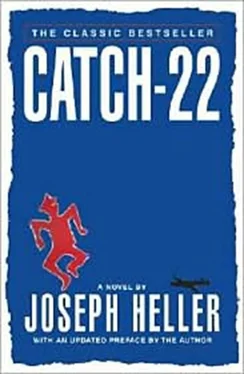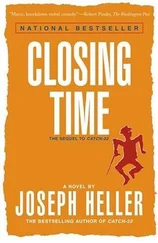
The island of Pianosa lies in the Mediterranean Sea eight miles south of Elba. It is very small and obviously could not accommodate all of the actions described. Like the setting of this novel, the characters, too, are fictitious.
TO MY MOTHER
AND TO SHIRLEY,
AND MY CHILDREN,
ERICA AND TED
It was love at first sight.
The first time Yossarian saw the chaplain he fell madly in love with him.
Yossarian was in the hospital with a pain in his liver that fell just short of being jaundice. The doctors were puzzled by the fact that it wasn’t quite jaundice. If it became jaundice they could treat it. If it didn’t become jaundice and went away they could discharge him. But this just being short of jaundice all the time confused them.
Each morning they came around, three brisk and serious men with efficient mouths and inefficient eyes, accompanied by brisk and serious Nurse Duckett, one of the ward nurses who didn’t like Yossarian. They read the chart at the foot of the bed and asked impatiently about the pain. They seemed irritated when he told them it was exactly the same.
“Still no movement?” the full colonel demanded.
The doctors exchanged a look when he shook his head.
“Give him another pill.”
Nurse Duckett made a note to give Yossarian another pill, and the four of them moved along to the next bed. None of the nurses liked Yossarian. Actually, the pain in his liver had gone away, but Yossarian didn’t say anything and the doctors never suspected. They just suspected that he had been moving his bowels and not telling anyone.
Yossarian had everything he wanted in the hospital. The food wasn’t too bad, and his meals were brought to him in bed. There were extra rations of fresh meat, and during the hot part of the afternoon he and the others were served chilled fruit juice or chilled chocolate milk. Apart from the doctors and the nurses, no one ever disturbed him. For a little while in the morning he had to censor letters, but he was free after that to spend the rest of each day lying around idly with a clear conscience. He was comfortable in the hospital, and it was easy to stay on because he always ran a temperature of 101. He was even more comfortable than Dunbar, who had to keep falling down on his face in order to get his meals brought to him in bed.
After he had made up his mind to spend the rest of the war in the hospital, Yossarian wrote letters to everyone he knew saying that he was in the hospital but never mentioning why. One day he had a better idea. To everyone he knew he wrote that he was going on a very dangerous mission. “They asked for volunteers. It’s very dangerous, but someone has to do it. I’ll write you the instant I get back.” And he had not written anyone since.
All the officer patients in the ward were forced to censor letters written by all the enlisted-men patients, who were kept in residence in wards of their own. It was a monotonous job, and Yossarian was disappointed to learn that the lives of enlisted men were only slightly more interesting than the lives of officers. After the first day he had no curiosity at all. To break the monotony he invented games. Death to all modifiers, he declared one day, and out of every letter that passed through his hands went every adverb and every adjective. The next day he made war on articles. He reached a much higher plane of creativity the following day when he blacked out everything in the letters but a, an and the. That erected more dynamic intralinear tensions, he felt, and in just about every case left a message far more universal. Soon he was proscribing parts of salutations and signatures and leaving the text untouched. One time he blacked out all but the salutation “Dear Mary” from a letter, and at the bottom he wrote, “I yearn for you tragically. R. O. Shipman, Chaplain, U.S. Army.” R. O. Shipman was the group chaplain’s name.
When he had exhausted all possibilities in the letters, he began attacking the names and addresses on the envelopes, obliterating whole homes and streets, annihilating entire metropolises with careless flicks of his wrist as though he were God. Catch-22 required that each censored letter bear the censoring officer’s name. Most letters he didn’t read at all. On those he didn’t read at all he wrote his own name. On those he did read he wrote, “Washington Irving.” When that grew monotonous he wrote, “Irving Washington.” Censoring the envelopes had serious repercussions, produced a ripple of anxiety on some ethereal military echelon that floated a C.I.D. man back into the ward posing as a patient. They all knew he was a C.I.D. man because he kept inquiring about an officer named Irving or Washington and because after his first day there he wouldn’t censor letters. He found them too monotonous.
It was a good ward this time, one of the best he and Dunbar had ever enjoyed. With them this time was the twenty-four-year-old fighter-pilot captain with the sparse golden mustache who had been shot into the Adriatic Sea in midwinter and not even caught cold. Now the summer was upon them, the captain had not been shot down, and he said he had the grippe. In the bed on Yossarian’s right, still lying amorously on his belly, was the startled captain with malaria in his blood and a mosquito bite on his ass. Across the aisle from Yossarian was Dunbar, and next to Dunbar was the artillery captain with whom Yossarian had stopped playing chess. The captain was a good chess player, and the games were always interesting. Yossarian had stopped playing chess with him because the games were so interesting they were foolish. Then there was the educated Texan from Texas who looked like someone in Technicolor and felt, patriotically, that people of means-decent folk-should be given more votes than drifters, whores, criminals, degenerates, atheists and indecent folk-people without means.
Yossarian was unspringing rhythms in the letters the day they brought the Texan in. It was another quiet, hot, untroubled day. The heat pressed heavily on the roof, stifling sound. Dunbar was lying motionless on his back again with his eyes staring up at the ceiling like a doll’s. He was working hard at increasing his life span. He did it by cultivating boredom. Dunbar was working so hard at increasing his life span that Yossarian thought he was dead. They put the Texan in a bed in the middle of the ward, and it wasn’t long before he donated his views.
Dunbar sat up like a shot. “That’s it,” he cried excitedly. “There was something missing-all the time I knew there was something missing-and now I know what it is.” He banged his fist down into his palm. “No patriotism,” he declared.
“You’re right,” Yossarian shouted back. “You’re right, you’re right, you’re right. The hot dog, the Brooklyn Dodgers. Mom’s apple pie. That’s what everyone’s fighting for. But who’s fighting for the decent folk? Who’s fighting for more votes for the decent folk? There’s no patriotism, that’s what it is. And no matriotism, either.”
The warrant officer on Yossarian’s left was unimpressed. “Who gives a shit?” he asked tiredly, and turned over on his side to go to sleep.
The Texan turned out to be good-natured, generous and likable. In three days no one could stand him.
He sent shudders of annoyance scampering up ticklish spines, and everybody fled from him-everybody but the soldier in white, who had no choice. The soldier in white was encased from head to toe in plaster and gauze. He had two useless legs and two useless arms. He had been smuggled into the ward during the night, and the men had no idea he was among them until they awoke in the morning and saw the two strange legs hoisted from the hips, the two strange arms anchored up perpendicularly, all four limbs pinioned strangely in air by lead weights suspended darkly above him that never moved. Sewn into the bandages over the insides of both elbows were zippered lips through which he was fed clear fluid from a clear jar. A silent zinc pipe rose from the cement on his groin and was coupled to a slim rubber hose that carried waste from his kidneys and dripped it efficiently into a clear, stoppered jar on the floor. When the jar on the floor was full, the jar feeding his elbow was empty, and the two were simply switched quickly so that the stuff could drip back into him. All they ever really saw of the soldier in white was a frayed black hole over his mouth.
Читать дальше













